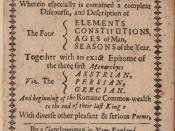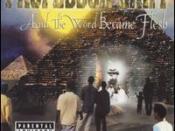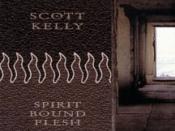Anne Bradstreets is an amazing poet of her time. The poem ÃÂThe Flesh and the SpiritÃÂ is a struggle between two sisters that can never be separated, Flesh and Spirit-body and soul, ultimately ending in final peace. Their inflamed arguments are about the ideal values of life and what matters to the human race. Flesh is for riches, pleasure, and the publicÃÂs eye. She values earthly items and her fulfillment of her wants. Spirit finds satisfaction is God and the thought of Heaven. Their fight ends up in separation, finally-at last.
ÃÂBe still, thou unregenerate part,Disturb no more my settled heart,For I have vowed (and so will do)Thee as a foe still to pursue,And combat with thee will and mustUntil I see thee laid in thÃÂ dust.
Sister we are, yea twins we be,Yet deadly feud ÃÂtwixt thee and me,For from one father are we not.
Thou by old Adam wast begot,But my arise is from above,Whence my dear father I do love.
Thou speakÃÂst me fair but hatÃÂst me sore.
Thy flattÃÂring shows IÃÂll trust no more.
How oft thy slave hast thou me madeWhen I believed what thou hast saidAnd never had more cause of woeThan when I did what thou badÃÂst do.
IÃÂll stop mine ears at these thy charmsAnd count them for my deadly harms.
Thy sinful pleasures I do hate,Thy riches are to me no bait.
Thine honors do, nor will I love,For my ambition lies above.
Spirit starts off by looking down upon Flesh and calling her ÃÂunregenerate.ÃÂ Flesh is corrupt in human nature. Spirit does not want to hear any more lip from the Flesh. She is set on loving God and Flesh canÃÂt do anything about it. The poem goes on to state Spirit vowÃÂs that Flesh, her sister, is her enemy. They are nothing alike, total opposite from one another. The sister are pitched in a ÃÂcombatÃÂ between each other and with which Spirit will not stop until victory is in hand. "Laid in th' dust" is a strong line. The only way for Flesh and Spirit to be free is if one dies.
The Spirit admits being a twin sister to Flesh, but the main reason they canÃÂt agree is because they donÃÂt have the same father. SpiritÃÂs father is God, the Heavenly Father. FleshÃÂs god is Adam. Adam is on earth, which gives me the impression of separation from God because of Adams sin. That separation is carried over onto the struggle between Spirit and Flesh, but no matter what fighting goes on they still have a link between one another with the same mother. Flesh and Spirit are one in the same soul, they canÃÂt be parted, they are sisters.
Temptation is the worldÃÂs main cause of sin. Spirit realizes the trickery of Flesh in tempting her. Putting on a ÃÂshow,ÃÂ but itÃÂs full of deceptions. Spirit admits to have fallen a time or two, but she wonÃÂt believe the lies of her sister anymore. Being a ÃÂslaveÃÂ to the worldly desires. Spirit swore to itÃÂs self to not let Flesh dupe her and proudly states that the temptations will not overthrow her faith in God.
The last two lines of the selection sum up SpiritÃÂs overall thoughts. She wishes to be turn loose the ties to Flesh, but because they are the same person her wishes cannot be granted. However the last two stanzaÃÂs state, ÃÂIf I of Heav'n may have my fill,/Take thou the world, and all that will.ÃÂ If they are one in the same person, how can Spirit be sent to Heaven and Flesh take ÃÂthe world and all that will?ÃÂ Bradstreet is talking about the afterlife, the only place where Spirit can be absolutely free from Flesh.
This entire poem is the fight between the spiritual and physical world. No matter where Spirit goes, or how determined she is to run away, she cannot break loose from the world. They will always be each others sister, with the same mother. They are related. Only in death may their separation take place. From death their soul will go home to their own father. ÃÂThe Flesh and the SpiritÃÂ speaks to everyone. We all have that ÃÂtwin sisterÃÂ inside of us, the one that desires the world try to obtain instantaneous satisfaction in things that we are well aware will not last. Basically, the poem states that we all have an ongoing battle inside of us, but you have to opt for which sister to take after. They are both present inside of you, but after death sooner or later one wins and the other one dies.
Anna Bradstreet, "The Flesh and the Spirit"





